|
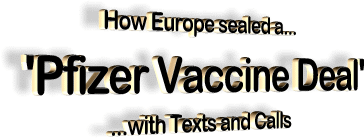
by Matina Stevis-Gridneff
April 28, 2021
from
NYTimes Website
Recovered through Archive Website
PDF version
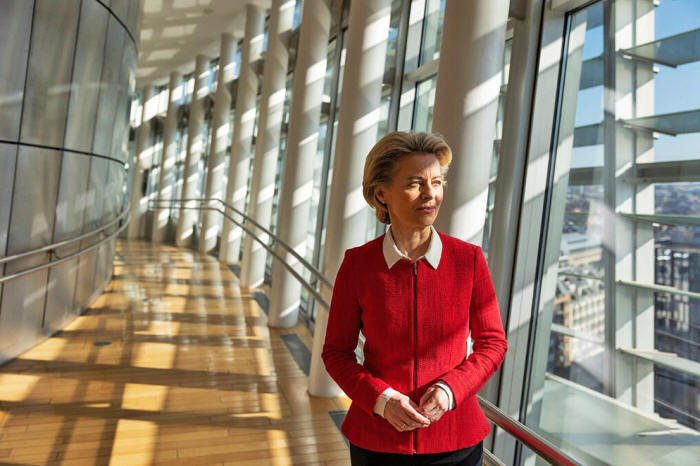
Ursula von der Leyen,
the president
of the European Commission,
in Brussels, on
Sunday.
Credit: Ksenia
Kuleshova
for The New
York Times
The
European Union
is about
to sign
a
deal for 1.8 billion doses of the
Pfizer-BioNTech
vaccine
after a
dispute with AstraZeneca
derailed
its vaccination campaign.
Here's how
it came about...
BRUSSELS
It was February and things were going from bad to
worse for the European Union's vaccination campaign, and for its top
executive,
Ursula von der Leyen.
Much of Europe was in lockdown, people were dying and the bloc was
running low on doses of vaccines after its biggest supplier,
AstraZeneca, announced production problems.
Critics inside and outside the European Union
questioned Ms. von der Leyen's leadership and
accused her of mishandling the crisis.
It was at that low point that she caught a break.
For a month, Ms. von der Leyen had been
exchanging texts and calls with
Albert Bourla, the chief
executive of
Pfizer, another vaccine supplier to
the bloc.
And as they spoke, two things became clear:
That personal diplomacy played a big role in a
deal, to be finalized this week, in which the European Union will
lock in 1.8 billion doses from Pfizer, which, with its smaller
German partner,
BioNTech, made the first
Covid-19 vaccine to get regulatory
approval in the European Union.
The new contract will include a 900-million-dose order through 2023,
with an option for another 900 million, Ms. von der Leyen said in an
interview.
"I am convinced that we are in this for the
long haul," she said.
The deal will establish the European Union as
Pfizer's biggest single client by far; the company has so far sold
300 million doses to the United States.
The contract will permit the European Union to
resell or donate the vaccines to partners, empowering it to conduct
vaccine diplomacy and support struggling efforts to immunize people
in poorer countries.
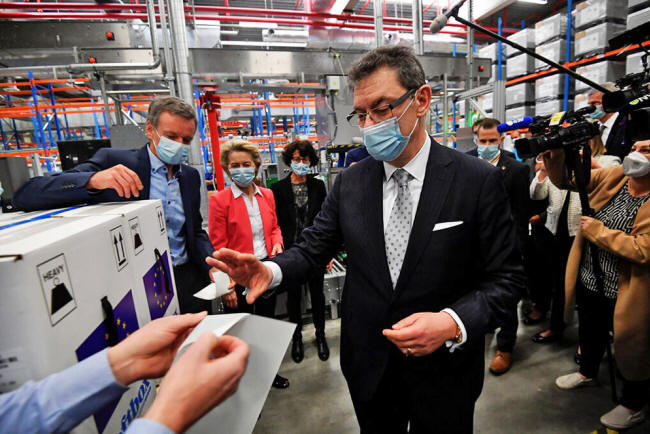
Albert Bourla, the
Pfizer chief executive,
during a visit last
week, at a Pfizer factory in Belgium.
Credit: Pool photo by
John Thys
Ms. von der Leyen and Mr. Bourla first connected in
January, when the pharmaceutical boss had to explain why his company
had to cut vaccine supplies temporarily while it upgraded
manufacturing facilities in Belgium.
In November, the European Union signed an
initial deal with the company for 200 million doses, with
the option to add 100 million.
As the improvements at the Belgium plant moved along with relative
ease, the discussions between the E.U. leader and the pharmaceutical
chief continued, both recounted in interviews with The New York
Times.
As they talked, the pandemic was raging across Europe, and Pfizer
and BioNTech were hard at work trying to step up production.
To increase the companies' production capacity
even further, the chief commercial officer at BioNTech, Sean
Marett, was lining up regulatory approval for a newly acquired
plant in Germany, which was already producing vaccines and
stockpiling them in anticipation of getting a green light.
By the end of March, when the plant got its authorization, it had
already produced 11 million doses, which were soon directed to the
European Union.
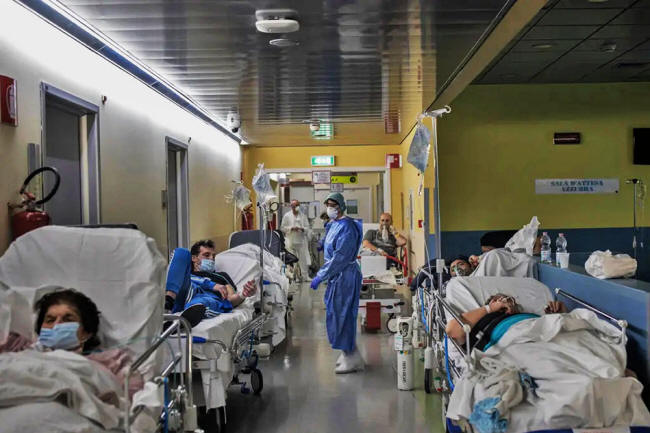
An overcrowded emergency room
in Bergamo,
Italy, in March 2020.
Credit: Fabio
Bucciarelli
for The New
York Times
The calls resulted in a string of deals between the European Union
and the companies.
On Feb. 17, the bloc announced an order for
another 200 million shots.
On April 19, it activated an option to get
yet another 100 million.
Accounts of how the deals came about, related by
Ms. von der Leyen, Mr. Bourla, Mr. Marett and another nine
officials and experts involved, reveal a striking alignment
of political survival and corporate hustle.
In her interview, Ms. von der Leyen played down the political
pressures she had faced, and said she had been confident things
would improve.
"I knew that the upscaling of the deliveries
would have a slow start by nature in the beginning, and
therefore, I also knew the first quarter was going be tough,"
she said.
"I did not expect it to be as tough, because
we did not include the possibility that AstraZeneca would reduce
deliveries by 75 percent.
That was a heavy setback."
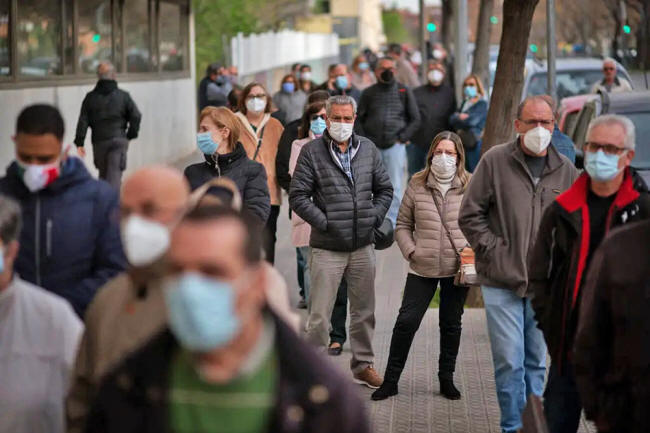
People lining up outside a public
hospital
to receive a
dose of the AstraZeneca vaccine
this
month in Barcelona, Spain.
Credit: Emilio
Morenatti/Associated Press
Mr. Bourla said he built a bond with Ms. von der Leyen.
"Multiple leaders of the world, they would
reach out to me, from presidents or prime ministers and kings,
and general secretaries of organizations," Mr. Bourla said.
Mr. Bourla said he and Ms. von der Leyen had,
"developed a deep trust, because we got into
deep discussions."
He said:
"She knew details about the variants, she
knew details about everything. So that made the discussion, way
more engaged."
Despite the deals with Pfizer and BioNTech,
Europe is still playing catch-up when it comes to vaccinating its
citizens
As of this week, 22 percent of European Union
nationals have received at least one dose of a Covid-19 vaccine, in
contrast to half of Britons, 42 percent of Americans and more than
62 percent of Israelis, according to
Our World in Data.
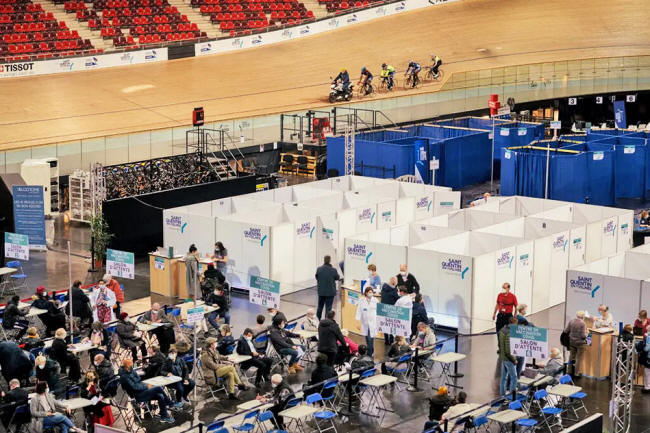
A vaccination center
at a velodrome near Paris.
Credit: Dmitry
Kostyukov for The New York Times
But the European Union has now made up for the vaccine it did not
get from AstraZeneca - the bloc is
suing over the missed doses - and
has moved forward its target date for getting 70 percent of its
adults fully immunized.
It is now July, instead of September.
The bloc is already one of the world's biggest producers and
exporters of
Covid-19 vaccines, with just over
159 million doses shipped to 87 countries since December.
That is almost exactly as many as it has kept at
home to immunize its own people.
The agreement with Pfizer and BioNTech will stipulate that the shots
be produced in Europe, bringing home not just the finished product,
but also most of the 280 components that go into making it, Ms. von
der Leyen and Mr. Bourla of Pfizer said.
The contract will also allow for a range of different vaccine
products.
An internal European Commission assessment of the bloc's needs over
the next two years, which is still being reviewed and was seen by
The Times, lays out ballpark figures for how many doses might be
necessary under different scenarios.
According to the draft assessment, the bloc might
require up to 510 million booster doses in 2022 and 2023.
Mr. Bourla said he expected a booster would be needed six to twelve
months after people get their second shot, although some public
health experts note that it is not clear yet whether that will be
necessary.
And the assessment includes a worst-case scenario
for a new vaccine to target an "escape mutant," a variant of the
coronavirus that is too resistant to existing shots.
The draft says the European Union would require
640 million doses of this type of vaccine for two doses per adult.
And it puts the number of pediatric vaccines at
130 million for 2022 and 65 million for 2023.
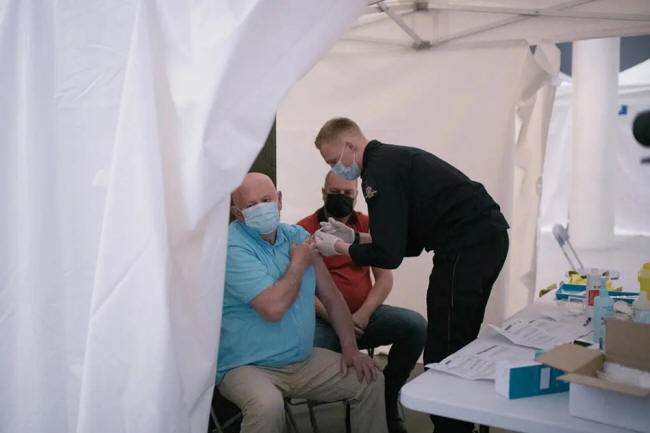
Vaccinations taking place
at the
velodrome near Paris in April.
Credit: Dmitry
Kostyukov for The New York Times
The deal is not without risks, or critics.
Countries and experts worry that the European
Union may be becoming too dependent on Pfizer, and failing to hedge
its bets in the event of problems with the vaccine or its
production.
"I would caution against going for Pfizer/BioNTech
only," said Prof. Peter Piot, a microbiologist who
advises Ms. von der Leyen.
"That is too high risk for me,
scientifically," he said, though he noted that mRNA technology
vaccines like Pfizer's have so far been working well.
Of the new E.U. deal with Pfizer, Professor Piot
said,
"My interpretation is, what works is who can
deliver."
Ms. von der Leyen said the European Union could
still procure doses from other companies.
She said the bloc was following the development of protein-based
vaccines made by Novavax and Sanofi, as well as mRNA vaccines from
Moderna, which are already being used in Europe, and CureVac, which
is under review by the E.U. regulator.
The Johnson & Johnson vaccine, which was rolled
out in Europe this month, is also attractive because of its
single-dose regimen and easy storage, she said.
The Pfizer shot is also expensive.
While the financial details of the new
agreement have not been disclosed, the previous contract priced
the shot at approximately 15.5 euros, or about 19 dollars,
making it the second-most expensive vaccine in the region after
Moderna.
European Union members will each decide whether
they want to use their full allocations of doses, or leave some for
others to absorb, or to be resold or donated.
They will also be free to make bilateral
agreements with other pharmaceutical companies for vaccines in the
future.
The new contract does little to address mounting global calls for
the release of patents or for technology transfers to ensure that
more of the world gets vaccinated soon.
With India in the throes of a catastrophic wave
of the virus, and the majority of the world's population still far
from getting access to a first dose of any vaccine, Europe's talk of
doses for children and boosters seems out of step with global needs,
health experts say.
And while Ms. von der Leyen says the deal will enable the
European Union to help poorer regions, it reinforces the fact that
the rich are still coming first in the global scramble for vaccines.
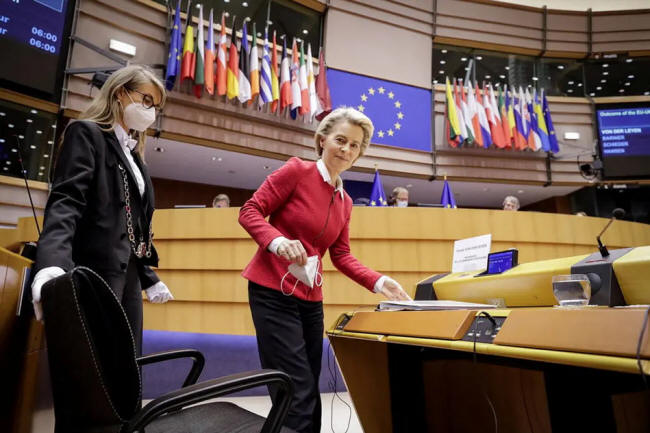
Ms. von der Leyen
at the European
Parliament in Brussels on Tuesday.
Credit: Pool
photo by Olivier Hoslet
Siddartha Sankar Datta, a
senior official with the World Health Organization (WHO)
in Europe, said he worried about how the deal would affect global
supply.
"I think the bottom line should be that the
access to this vaccine should not be a prerogative of the
purchasing power of the country," he said.
"As countries make the effort to ensure their
population base gets benefits, we have to still keep pushing
ourselves to ensure more equitable access."
Still, for Ms. von der Leyen, and for the
European Union, the deal with Pfizer and BioNTech offers a chance to
remedy past mistakes.
"Europe has decided to make sure that, under
any circumstances, they will be prepared if there's more need,
and as a consequence of that political decision, they are now
prepared to take much bigger risks," said Moncef Slaoui,
who led the U.S. vaccine effort
Operation Warp Speed, and is in
frequent contact with Ms. von der Leyen on E.U. strategy.
"Politics and science are intertwined here," he said.
|








